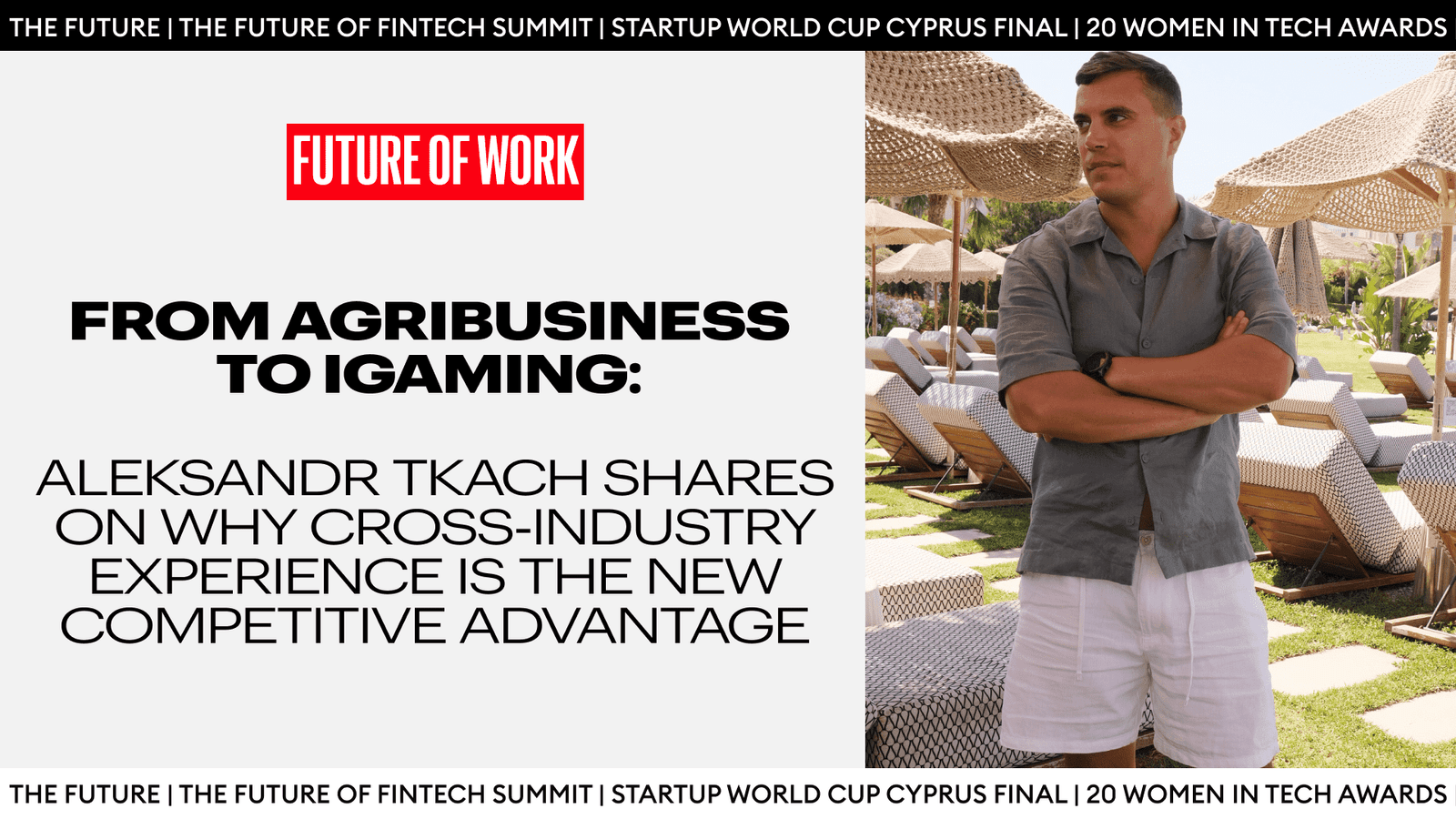In 2025, nearly 48% of Chief Transformation Officers are now fully dedicated to transformation efforts, up from just 2% three years ago. This sharp increase signals more than operational change; it reflects a fundamental reimagining of what executive leadership looks like when industry boundaries are seen as opportunities rather than endpoints.
Alexandr Tkach is the CEO of Dream Play, a fast-growing iGaming company building immersive gaming experiences across platforms like VR, mobile, and web. The company, headquartered in Cyprus with a distributed global team, is focused on designing high-performance games that combine engaging narratives, cutting-edge tech, and user-centric monetization models.
Follow THE FUTURE on LinkedIn, Facebook, Instagram, X and Telegram
But before he was leading strategy and innovation in one of the world’s fastest-evolving sectors, Aleksand Tkach was managing a dairy farm operation in Ukraine for one of the country’s largest agricultural holding companies. There, he oversaw the implementation of robotic milking systems and precision farming technologies, promoting automation and analytics in an industry often viewed as traditional.
When he first stepped into the cockpit of a combine harvester, he didn’t imagine that he would one day be launching VR games in one of the world’s fastest-growing markets. His journey from the agribusiness and into the high-stakes world of iGaming is unique and yet not an anomaly; it reflects where leadership is headed.
According to Deloitte, organizations led by executives with cross-industry experience across sectors are 32% more likely to be viewed as innovative by their boards and stakeholders. and forward-thinking. Meanwhile, Deloitte’s 2025 Chief Transformation Officer survey found that nearly half of CTrOs (48%) are now fully dedicated to transformation efforts, up from just 2% in 2022, and transformation budgets have surged by as much as 2.5x in the same period. Companies are actively seeking leaders who can navigate complexity across multiple sectors.
From developing methodical thinking behind the optimization of crop yields to driving marketing efforts in digital entertainment, Aleksandr Tkach’s career transition reveals something profound in modern C-suite leadership: there is a growing belief that functional expertise is overriding industry boundaries. While sector experience still holds weight, the quality of the skills leader hone in their previous work cultures, especially if these are high-performing organizations regardless of industry, is becoming a stronger indication of future success.

Industry boundaries may have once been perceived as closed doors. But today, what you’ve sharpened and where you’ve worked may just be the key to unlocking a completely new career terrain.
Roots in the Field: Aleksandr Tkach’s Origin Story
“I first got involved in agribusiness through my family. Our farm spans thousands of hectares, growing grains like sunflower, wheat, corn, and rapeseed, along with a small orchard. But my hands-on experience really began abroad (in Finland and Denmark) and later in the US with DuPont Pioneer, a global leader in GMO seed production.
Over time, I learned to operate every kind of tractor and combine harvester, even tracked vehicles. I also managed a dairy farm built from scratch by a holding company, where we installed robotic and semi-automatic milking systems that required human oversight rather than full automation. Most processes were highly automated, which took our production and agribusiness as a whole to a new level.
Starting out was truly hands-on, filled with learning as I went. From understanding crop cycles to managing labor and machinery. It demanded resilience and adaptability, but it was incredibly rewarding to see the fruits of hard work come to life.”
From Soil to Screens
For Alexander Tkach, the move from agribusiness to iGaming was about testing his skills in a faster-paced environment. “After years in agriculture, I wanted to challenge myself in a faster-paced, global environment,” he says. “The tech industry is like an ocean, largely unexplored, with gaming as its deepest trench—full of mysteries waiting to be uncovered.”
A growing number of leaders are leaving their industries, not necessarily because the sectors are stagnant, but because their roles within them no longer offer challenge, alignment, or relevance. In 2025, 71% of full-time employees, including those in leadership, reported burnout, while 40% of executives said their skills had been made obsolete by rapid technological culture shifts. Automation alters the core functions in industries like manufacturing, clerical work, and more traditional sectors, including agriculture. Leaders are increasingly moved toward environments that offer reinvention and personal and professional growth.
“What attracted me to tech and gaming was the speed of innovation,” he says. “In agriculture, I worked on drought-resistant corn hybrids that could survive in harsh conditions—fascinating work, but it takes years to see results. In gaming, you can test ideas, iterate, and scale rapidly. You’re building entire worlds, creating experiences that didn’t exist before.”
The transition wasn’t without challenges. Aleksandr Tkach had to learn an entirely new jargon. Software development cycles. User acquisition funnels. Gaming-specific regulations. “Agriculture deals with physical processes you can see and touch. Gaming requires thinking about virtual products and constantly shifting user behavior,” he adds.
The business models proved particularly challenging to master. “Even with my management degree from Lincoln, the monetization strategies in gaming were completely foreign,” he admits. “Traditional business education doesn’t prepare you for freemium models or in-app purchase psychology. I had to learn through hands-on experience.”
Still, many of his instincts proved transferable. “We don’t fertilise at random,” he says, “and we don’t build games on instinct […] The fundamentals are more transferable than you’d expect,” he reflects.
Transferable Leadership in Action
Before he led product and strategy at Dream Play, Alexander Tkach was troubleshooting robotic milking systems and analyzing soil samples with drone technology. On the surface, these worlds couldn’t seem more different, yet both require understanding systems at their most fundamental levels.
“Running large-scale farm operations taught me to see every process from multiple angles,” Aleksandr Tkach explains.
“You learn to trace cause-and-effect relationships, whether you’re diagnosing why crop yields are declining or figuring out what’s driving user churn. The methodology is remarkably similar.”
This analytical approach is now central to his leadership in the iGaming industry. “In agriculture, you don’t fertilise soil that already has enough minerals. You analyse the land first, often with drones and big data. We applied resources only where needed.”
The same operational principles apply at Dream Play. “We bring that same philosophy to product development. Every concept gets tested like a hypothesis. We scale only what the data validates.”
This methodical approach extends beyond product decisions and into organizational structure. “Every move must be deliberate,” Aleksandr Tkach says. “Agribusiness taught me to use methodologies because it’s a science, not just business. Without a clear justification, you can’t take the next step or make sound decisions.”
His team at Dream Play operates using the 5W+1H framework: Who, What, When, Where, Why, and How. This ensures every initiative has a clear justification before moving forward. It’s a discipline born from farming, where unclear decisions can cost entire seasons.
Perhaps most surprisingly, agriculture taught him the value of patience in an industry obsessed with speed. “Farming works on natural cycles. You plant, tend, harvest—each stage has its timing,” he says. “That perspective helps us maintain focus during development cycles and avoid the trap of rushing features to market before they’re ready.”
The human element translates, too. Whether managing seasonal farm crews or game development teams, the core question remains the same: “Does your team see you as a leader they trust, or just someone giving orders?” In both environments, trust enhances performance, and authenticity is not bound by industry boundaries. At the end of the day, processes run on energy, in every sense of the word.
Cross-industry leaders like Aleksandr Tkach bring something invaluable: they question assumptions that insiders may take for granted. Their diverse experience creates what leadership researchers call an “innovation-friendly culture, where creativity and flexibility are valued over rigid adherence to how things have always been done.” They introduce new ways of thinking and problem-solving, often cutting through routine with ideas drawn from entirely different contexts, and in doing so, they challenge teams to rethink what’s possible.
A Training Ground for the Next Generation
Many professionals assume their first industry defines the rest of their career. That a decade in agriculture means tech is off-limits, or that finance experience stops you from entering healthcare.
The reality, increasingly supported by workforce trends, suggests otherwise. According to the World Economic Forum’s Future of Jobs Report (2023), 23% of global jobs are expected to change significantly due to technology adoption, making adaptability and cross-sector skill translation more valuable than ever.
Each sector offers lessons that prove valuable elsewhere, particularly for those willing to look beyond traditional boundaries. “You learn to stay calm and analytical when an entire season depends on one decision,” Tkach reflects. “That mindset travels with you.”
He’s careful to frame his agricultural background as foundation building. “I was processing massive datasets when most industries were still using spreadsheets,” he says. “Robotic milking systems, precision agriculture, real-time field analytics—we were working with complex automation years before it became standard elsewhere.”
That experience provided something business school couldn’t: real-world systems management under high-stakes conditions. “It’s the best leadership training I’ve encountered,” he admits.
His path offers a practical lesson for younger professionals questioning whether their current role limits future options. Industries that seem unrelated often share fundamental challenges, whether that is resource optimization, data analysis, team coordination, or managing stress under pressure.
The key takeaway here is not that every career change will work, but that dismissing opportunities based on what appears to be an industry mismatch may mean missing growth possibilities. As traditional sector boundaries blur, the professionals who thrive and find success professionally and personally will be those who recognize transferable value in their nonlinear experiences.
When asked what advice he would give to others thinking or already facing similar transitions, Aleksandr reflects on what has worked for him: “To make things work out, you need to believe—and always see yourself as a student.
I’ve learned that for anything to truly succeed, belief is essential. But belief alone isn’t enough; it’s just as important to stay open-minded and curious, constantly learning as if you’re still a student.
It doesn’t matter how much you know or what you’ve already achieved—there’s always something more to discover, and always a new lesson around the corner. Every time I’ve embraced this mindset, things have started falling into place. So I remind myself: believe, and never stop learning.”














